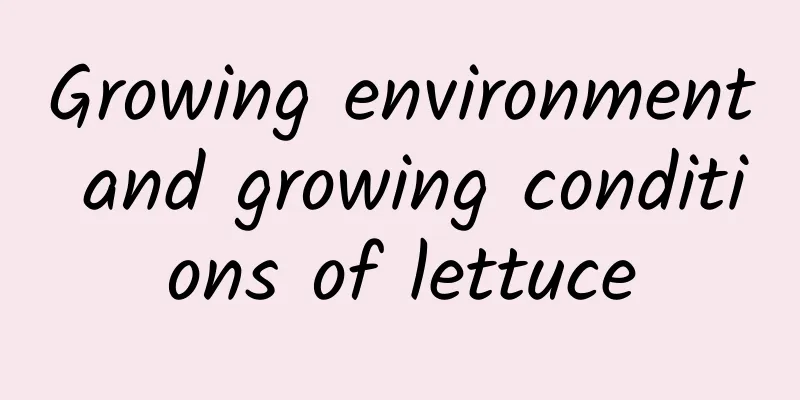Growing environment and growing conditions of lettuce

Lettuce growing environment and conditionsLettuce was originally distributed along the Mediterranean coast of Europe. It was introduced to China in the late Qing Dynasty and is widely cultivated in China's southeastern coastal areas and Guangdong and Guangxi regions. In recent years, the cultivated area has expanded rapidly across the country and it has become a common vegetable on people's tables. Lettuce Growing ConditionsLettuce is a long-day crop and prefers an environment with plenty of sunlight. Only then will its leaves grow green and thick. If it is dark and humid for a long time, it will affect the development of leaves and stems. Lettuce prefers slightly acidic soil. The suitable soil pH value is about 6.0. When the pH value is below 5 and above 7, it will not grow well. Lettuce growing temperatureLettuce prefers a cool environment and is not resistant to high or low temperature environments. The suitable growth temperature is between 15-20 degrees, the suitable germination temperature is 18-22 degrees, it will not germinate above 30 degrees, and it can tolerate short-term low temperatures of 0 degrees. Lettuce growing processThe growth process of lettuce includes the germination stage, seedling stage, rosette stage and heading stage. It takes about 10 days from seed germination to cotyledon unfolding, and about 20 to 25 days from the appearance of true leaves to the unfolding of 5 leaves. After that, it takes half a month to a month for the heart leaves to begin to curl up, and it takes about 30-40 days for the heart leaves to accelerate the curling into a hypertrophic leaf head. Lettuce planting time and methodIt is best to plant lettuce from October to December, and avoid overly cold or overheated environments. Before planting, buy high-quality, plump seeds, choose disease-resistant varieties with a higher germination rate, prepare a suitable seedbed, disinfect it, and water it thoroughly for later use. Mix the seeds with sand and sow them into the soil, cover them with soil, and place them in a ventilated environment. |
<<: The growing environment and local conditions of Cistanche deserticola
>>: The growth environment and local conditions of Dendrobium officinale
Recommend
Saffron planting conditions, regions and methods
1. Planting conditions When planting, you should ...
How to grow the Dream Angel succulent
The succulent plant Dream Angel is very beautiful...
Can Sansevieria be exposed to the sun? Can it be exposed to the sun in summer?
Can tiger lily be exposed to the sun? The origin ...
Margarite flower cultivation methods and precautions
1. Maintenance methods 1. Temperature: Marguerite...
How to grow asparagus fern
1. Loosen the soil To care for asparagus fern, yo...
Can the soil with rotten roots of green radish still be used?
1. Not recommended The adaptability of the green ...
How to grow Autumn Lily
1. Maintenance methods 1. Temperature: Autumn lil...
What are the benefits of urea for watering flowers? How to use urea for watering flowers
Benefits of urea watering Urea is a very good fer...
The growing environment and local conditions of Trumpet Creeper
Trumpet creeper growth environment and conditions...
Cultivation methods and precautions of Sedum bulbiferum
soil Its requirements for soil are not high, but ...
Blue Enchantress Flower Language
1. Pure Love For a long time, when talking about ...
How to care for cymbidium orchids
As the New Year approaches, many potted flowers a...
How to prune the Guanyin lotus
How to prune the Avalokitesvara It is generally b...
How to trim Green Palace water plants? Trimming methods and diagrams
Green Palace Waterweed Trimming Time There is gen...
The main value of the king flower
The main value of the king flower: ornamental In ...









